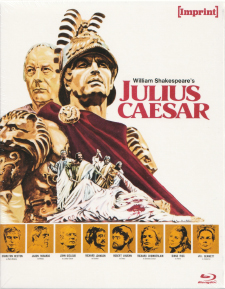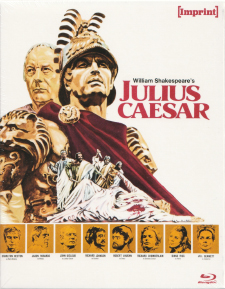Julius Caesar (1970) (Blu-ray Review)

Director
Stuart BargeRelease Date(s)
1970 (July 8, 2022)Studio(s)
American International Pictures (Imprint Films/Via Vision Entertainment)- Film/Program Grade: B-
- Video Grade: C
- Audio Grade: B
- Extras Grade: B-
Review
Regarded as one of the lesser adaptations of William Shakespeare’s work, the 1970 release of Julius Caesar is noted for not only having a more obvious lower budget in comparison to Joseph L. Mankiewicz’s and John Houseman’s 1953 version starring Marlon Brando and James Mason, but it’s also singled out for featuring a very poor performance by Jason Robards, who purportedly was unhappy with appearing in the film as he had never read or seen any works based upon Shakespeare. He supposedly went as far as trying to buy his way out of the film, but was forced to carry on in a role that was originally envisioned as being inhabited by Orson Welles. Nevertheless, the film came and went, critically derided and mostly forgotten.
Julius Caesar was marketed as “No grander Caesar... no greater cast!” Indeed, the cast is littered with many familiar faces, most of whom had participated in plays or films of Shakespeare’s material in the past. Among them was Charlton Heston as Mark Antony, John Gielgud as Julius Caesar, Richard Johnson as Cassius (a role inhabited by Gielgud in the 1953 film), Robert Vaughn as Casca, Richard Chamberlain as Octavius, and the aforementioned Jason Robards as Brutus. There’s also brief appearances by Diana Rigg as Portia, Jill Bennett as Calpurnia, Michael Gough as Metellus Cimber, Christopher Lee as Artemidorus, and André Morell as Cicero. Most of these latter actors appear in only one or two scenes, some without lines, but they’re impossible to miss. Add to that the producorial muscle of Peter Snell (Hennessy, The Wicker Man) and the direction of Stuart Burge (Othello, There Was a Crooked Man).
Robards is noted early on as predicting doom for the film, perhaps because he knew he wasn’t entirely right for it. Heston, meanwhile, was already banking on its success as he wanted to also make Antony and Cleopatra, which he did a couple of years later. He gives the largest and most overpowering performance, stealing the film from practically everybody involved, so much so that Mark Antony feels like the lead, even though he disappears from the film for great lengths of time. Both Robert Vaughn and Richard Johnson are also terrific, though Richard Chamberlain is otherwise wasted in only a few brief scenes. But is Jason Robards’ performance that bad? Does it destroy the entire film? Of course not. His performance is definitely wooden and picks up considerable energy after the assassination scene, but it doesn’t wreck the film. For years, both he and Heston would site his performance as one of the reasons why the film failed, but to his credit, Heston maintained that Robards was a fine actor. It’s a simple case of being miscast, but it’s all that critics could see when the film was released, never mind the film’s other aspects.
Today, Julius Caesar is being looked at with far more scrutiny than it was at the time, many noting more of its finer qualities rather than continuing to harp on its lesser ones. It’s still a competent version of Shakespeare and offers fine set pieces, including some impressive stunts during the battle scenes that close the film, not to mention the very bloody and very violent assassination scene that still holds up. In other words, it’s worth re-evaluation.
Julius Caesar was shot by cinematographer Kenneth Higgins on 35 mm film with Panavision cameras, and finished photochemically with an aspect ratio of 2.35:1. Imprint brings the film to Blu-ray from a master provided by Paramount Pictures with a bitrate that hovers between 30 and 40 Mbps. Unfortunately, this appears to be an ancient master that might have been prepared for DVD. It’s often soft with uneven grain, crushed blacks, and frequent, obvious ringing. Speckling and scratches are present throughout as well. Certain sections appear stronger than others, but even with merely decent saturation, the film is in dire need of a fresh scan off the original camera negative. It’s a watchable presentation, but outdated in every way.
Audio is included in English 2.0 mono LPCM with optional subtitles in English SDH. Dialogue exchanges are clear and precise and there’s good support for the unorthodox score by Michael J. Lewis. There’s a mild hiss present, but there are no dropouts or major distortion issues.
Julius Caesar on Blu-ray sits in a clear amaray case with what appears to be new artwork on the front and a still from the film on the reverse. Everything is housed in a slipcover featuring the film’s original theatrical artwork. The following extras are included:
- Audio Commentary by Lee Pfeiffer, Paul Scrabo, and Tony Latino
- Matthew Sweet on Julius Caesar (17:28)
- Neil Sinyard on Julius Caesar (24:21)
- Et tu, Burge? (35:33)
Olive Films released the film on Blu-ray in the US, but as a bare bones disc. Imprint remedies that with a few new extras. The audio commentary features Cinema Retro’s Lee Pfeiffer and film historians Paul Scrabo and Tony Latino. Though Pfeiffer is primarily in the driver’s seat, discussing his relationships with some of the cast members while they were still with us and the information about the film that they shared with him, Scrabo and Latino step up occasionally to emphasize certain points, but also give additional information. It’s a very natural track as the three men have a nice rapport with each other, but also provide valuable contextual details about the film and those who made it. Next, film critic Matthew Sweet highlights the differences between this film and other historical epics, the interplay between the actors and Heston’s desire to follow up this film with Antony and Cleopatra, the whys and hows of Jason Robards’ performance, how violent Julius Caesar’s death scene is, and the clash of acting styles and how it affects the film. Author Neil Sinyard discusses how the producer was worried about comparisons to the Marlon Brando version of the story, the finer points of the budget and the casting, the film’s stronger qualities, the variety of performances, and his reflections on how modern audiences might feel about the film. Et tu, Burge? features select members of the production crew who discuss their memories of the film. Participants include production accountant Maurice Landsberger, assistant director Nicholas Granby, production manager Denis Johnson, Jr., makeup artist Christopher Tucker, and grip David Cadwallader.
Imprint’s Blu-ray of Julius Caesar won’t win any awards for visual quality, but the very nice extras give this release an obvious edge over its US counterpart. A more definitive disc of the film is yet to come, but for the time being, Imprint’s release is the best you’re going to find, and find it you should as this film is far better and more entertaining than many give it credit for.
- Tim Salmons
(You can follow Tim on social media at these links: Twitter and Facebook. And be sure to subscribe to his YouTube channel here.)

